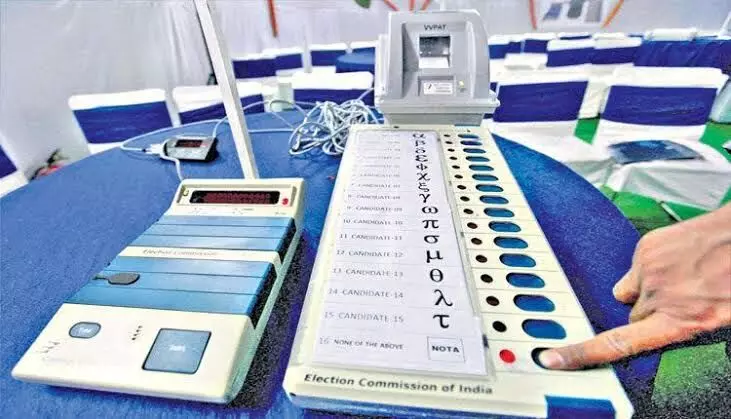EVM Robustness and Integrity defended amid election season
The ECI, in its affidavit, denounced the present petition as another attempt to cast unfounded doubts on EVMs/VVPATs, lacking substantial evidence.
By Newsmeter Network
Representational Image.
Hyderabad: As the nation gears up for elections, discussions surrounding the reliability of Electronic Voting Machines (EVMs) have once again taken center stage, with various theories and concerns being raised about their integrity.
When contacted for his perspective, DS Reddy, a prominent political analyst, emphasized the track record of EVMs in India’s electoral system. He noted that since their introduction in 2004, the party securing the maximum number of seats has changed 44 times in Assembly elections and twice in Lok Sabha elections. EVMs have facilitated significant electoral victories, including the All India Trinamool Congress’ three consecutive Assembly wins in West Bengal, the Aam Aadmi Party’s two consecutive Assembly victories in Delhi, and the CPI(M)’s four consecutive Assembly wins in Kerala.
Reddy also highlighted recent developments in the Supreme Court regarding Public Interest Litigations (PILs) targeting EVMs. He referenced the observations of Justice Sanjeev Khanna during the case WPC No 434/2023 Association for Democratic Reforms Vs ECI. Justice Khanna questioned the petitioner’s motives, remarking on the recurrent nature of such petitions. He pointed out that the Election Commission of India (ECI) consistently files detailed counter affidavits to address these concerns and questioned the need to revisit the issue every 6-8 months.
Notably, several High Courts have penalized petitioners for raising doubts about EVM integrity, classifying their actions as “Publicity Interest Litigations” rather than “Public Interest Litigations.”
In a recent case, the Delhi High Court displayed confidence in the transparent First Level Check (FLC) process and dismissed a petition by the Delhi Pradesh Congress Committee. The court expressed disappointment in the DPCC’s decision to abstain from participating in the FLC process and then questioning its integrity, stating that it did not reflect well on the petitioner.
The ECI, in its affidavit, denounced the present petition as another attempt to cast unfounded doubts on EVMs/VVPATs, lacking substantial evidence. The ECI anticipates similar petitions as the 2024 Lok Sabha Elections draw near, suggesting a possible malicious intent to create a false narrative around EVMs and undermine voter confidence.
The Commission emphasized that the ultimate test of any election system lies in its ability to accurately reflect the people’s will. EVMs have consistently met this criterion over the years. Furthermore, Constitutional courts, including the Honorable Supreme Court and various High Courts, have consistently upheld the use of EVMs in Indian elections and affirmed their integrity.
In sum, amid the ongoing electoral discourse, EVMs continue to stand as a reliable and integral component of India’s democratic process, consistently validated by both the judiciary and the will of the people.